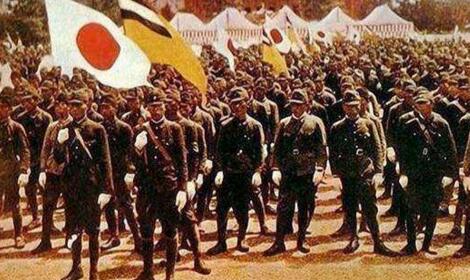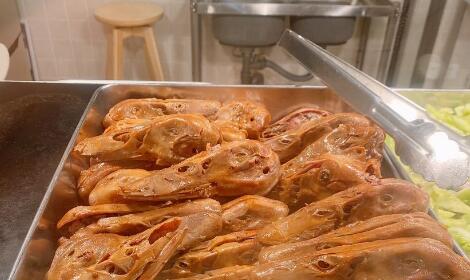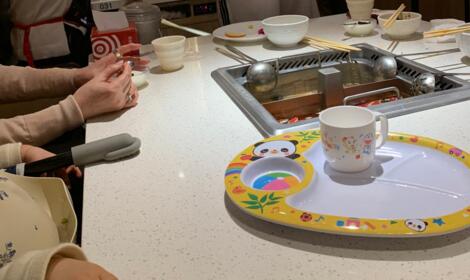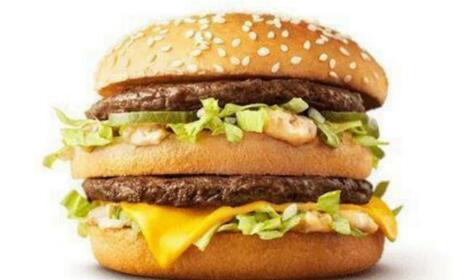日本的穷人都吃些什么?
正文翻译
Jaime Tatsubana
Hah, I know this. I can take a stab at this question.
My family used to live in a poor part of Tokyo (Adachi district)
I used to date this girl who worked at Gusto - one of the low paying restaurant chains in Japan (600 yen / hour - $6 USD / hour )
As boring as this answer might be - for the most part poor people eat normal food (although nutrition is questionable). Reason for this is because Japan has many low-price supermarkets that perfectly caters to the low to middle income class.
哈,我知道这个。我可以试着回答这个问题。
我家以前住在东京的贫民区(足立区)
我曾经和一个在Gusto工作的女孩约会,Gusto是日本一家低薪连锁餐厅(600日元/小时- 6美元/小时)
尽管这个答案可能很无聊——在大多数情况下,穷人吃的是正常的食物(尽管营养值得怀疑)。原因是日本有很多低价超市,完全迎合了中低收入阶层的需求。

This is Super-Tamade. I used to go here a lot in Osaka with my ex. It’s an ultra low-price super market.
Like any Japanese super market, they sell pre-packaged food that can be your lunch or dinner.
这是超级玉出。我以前在大阪和我的前任经常来这里。这是一个超低价的超市。
像任何日本超市一样,他们出售预包装食品,可以作为您的午餐或晚餐。


Check out the prices on these bentos! 198 yen! What a steal. That’s like $1.9 USD for a meal. They taste decent, I ate a bunch of these even when I wasn’t poor just out of fondness of going to Super-Tamade.
And they have these 1 yen sales everyday where if you purchased more than 1,000 yen worth of items you can get a bunch of stuff for 1 yen.
看看这些便当的价格吧!198日元!真便宜。这相当于一顿饭1.9美元。它们味道不错,即使我不穷的时候,我也吃了一堆,只是因为喜欢去超级玉出。
他们每天都有1日元的促销活动,如果你购买价值超过1000日元的商品,你就可以以1日元的价格买到很多东西。
I remember my ex saying that when she used to work at Gusto she’d buy food or ingredients from here. If her budget was super tight she’d just buy tofu and eat that for a week. 600 yen / hour works out to be 4,800 yen / per day. 4,100 yen / day after deductions. That’s as low as you’d get in Japan at the time - and even that would allow you to buy food like this every day and feed you full.
我记得我的前任说过,她以前在Gusto工作的时候,她会从这里买食物或配料。如果她的预算非常紧张,她就会买豆腐吃一个星期。600日元/小时,相当于4800日元/天。扣除后4100日元/天。这是当时日本最低的薪水,即使是这样,你也可以每天买到这样的食物,吃得饱饱的。
That being said, sext fruits and vegetables can be pricy and not affordable for low income people.
I think the real danger is when you’re eating stuff like this everyday, or if you have to support more members of your family. For example single moms who can only feed their children with pre-packaged foods or curry rice. It’s obviously not good for a child’s development and I think you’d consider that to be a silent type of poverty. That being said, when I used to live in Adachi district as a kid, I used to go to my friend’s house a lot and never really noticed anything they ate was out of the ordinary.
话虽如此,精选的水果和蔬菜可能价格昂贵,低收入人群则负担不起。
我认为真正的危险是当你每天都在吃这样的东西,或者你必须供养更多的家庭成员。例如,只能用预包装食品或咖喱饭喂养孩子的单亲妈妈。这显然不利于孩子的发展,我想你会认为这是一种无声的贫困。话虽如此,当我小时候住在足立区时,我经常去朋友家,从来没有真正注意到他们吃的东西与众不同。
Hah, I know this. I can take a stab at this question.
My family used to live in a poor part of Tokyo (Adachi district)
I used to date this girl who worked at Gusto - one of the low paying restaurant chains in Japan (600 yen / hour - $6 USD / hour )
As boring as this answer might be - for the most part poor people eat normal food (although nutrition is questionable). Reason for this is because Japan has many low-price supermarkets that perfectly caters to the low to middle income class.
哈,我知道这个。我可以试着回答这个问题。
我家以前住在东京的贫民区(足立区)
我曾经和一个在Gusto工作的女孩约会,Gusto是日本一家低薪连锁餐厅(600日元/小时- 6美元/小时)
尽管这个答案可能很无聊——在大多数情况下,穷人吃的是正常的食物(尽管营养值得怀疑)。原因是日本有很多低价超市,完全迎合了中低收入阶层的需求。
This is Super-Tamade. I used to go here a lot in Osaka with my ex. It’s an ultra low-price super market.
Like any Japanese super market, they sell pre-packaged food that can be your lunch or dinner.
这是超级玉出。我以前在大阪和我的前任经常来这里。这是一个超低价的超市。
像任何日本超市一样,他们出售预包装食品,可以作为您的午餐或晚餐。
Check out the prices on these bentos! 198 yen! What a steal. That’s like $1.9 USD for a meal. They taste decent, I ate a bunch of these even when I wasn’t poor just out of fondness of going to Super-Tamade.
And they have these 1 yen sales everyday where if you purchased more than 1,000 yen worth of items you can get a bunch of stuff for 1 yen.
看看这些便当的价格吧!198日元!真便宜。这相当于一顿饭1.9美元。它们味道不错,即使我不穷的时候,我也吃了一堆,只是因为喜欢去超级玉出。
他们每天都有1日元的促销活动,如果你购买价值超过1000日元的商品,你就可以以1日元的价格买到很多东西。
I remember my ex saying that when she used to work at Gusto she’d buy food or ingredients from here. If her budget was super tight she’d just buy tofu and eat that for a week. 600 yen / hour works out to be 4,800 yen / per day. 4,100 yen / day after deductions. That’s as low as you’d get in Japan at the time - and even that would allow you to buy food like this every day and feed you full.
我记得我的前任说过,她以前在Gusto工作的时候,她会从这里买食物或配料。如果她的预算非常紧张,她就会买豆腐吃一个星期。600日元/小时,相当于4800日元/天。扣除后4100日元/天。这是当时日本最低的薪水,即使是这样,你也可以每天买到这样的食物,吃得饱饱的。
That being said, sext fruits and vegetables can be pricy and not affordable for low income people.
I think the real danger is when you’re eating stuff like this everyday, or if you have to support more members of your family. For example single moms who can only feed their children with pre-packaged foods or curry rice. It’s obviously not good for a child’s development and I think you’d consider that to be a silent type of poverty. That being said, when I used to live in Adachi district as a kid, I used to go to my friend’s house a lot and never really noticed anything they ate was out of the ordinary.
话虽如此,精选的水果和蔬菜可能价格昂贵,低收入人群则负担不起。
我认为真正的危险是当你每天都在吃这样的东西,或者你必须供养更多的家庭成员。例如,只能用预包装食品或咖喱饭喂养孩子的单亲妈妈。这显然不利于孩子的发展,我想你会认为这是一种无声的贫困。话虽如此,当我小时候住在足立区时,我经常去朋友家,从来没有真正注意到他们吃的东西与众不同。
评论翻译
M
I live in a southern district of Tokyo. Whenever I am facing financial difficulties, I eat Tamagogake Gohan (rice with raw eggs. I always add furikake to make it more tasty) every day. The cost of one meal is about 100 yen.
我住在东京南部的一个地区。每当遇到经济困难时,我就会吃生鸡蛋拌饭(生鸡蛋配米饭,我会加拌饭素让它更美味),(拌饭素,一种以海苔、鲣鱼及芝麻为材料的颗粒状调味料)一顿饭的费用约为100日元。
Kotaro Hanawa
Unfortunately, I live in the Meguro Setagaya district (which is considered a upper class district) so I have to eat McDonald’s 100 yen burger every day to survive. Or if I have slightly easier economic condition, I eat this

不幸的是,我住在目黑世田谷区(这被认为是一个上流社会的地区),所以我必须每天吃麦当劳100日元的汉堡才能生存。如果我的经济状况稍微好一点,我就吃这个
Jaime Tatsubana to Kotaro Hanawa
Sympathy. Shaka Shaka chicken is bomb though!
同情。不过,沙卡沙卡鸡(将调料和炸鸡肉放在袋中,摇晃涂抹,日本麦当劳产品)是热量炸弹!
Kotaro Hanawa to Jaime Tatsubana
I can’t stop it. You know. I’m probably brainwashed.
我停不下来。你知道的。我可能被洗脑了。
Charley Black to Kotaro Hanawa
Why not eat rice? It has some nutritional value at least.
为什么不吃米饭呢?它至少有一些营养价值。
Ranald Fong to Charley Black
It is very hard to believe that rice has any nutritional value other than carbs. Vs McD burger, where you get a slice of cheese, a seasoned beef patty, ketchup/mustard, pickle, bread. Processed, yes but more nutritional variety.
A body needs much more than carbs. Proteins and vitamins, etc. No you won’t get it all from a McD burger, but much more than just rice. Hell, you’d die without enough salt.
很难相信大米除了碳水化合物还有其他营养价值。与麦当劳汉堡相比,麦当劳汉堡里有一片奶酪、调味牛肉饼、番茄酱/芥末酱、泡菜和面包。加工过的,是的,但更有营养。
身体需要的不仅仅是碳水化合物。还需要蛋白质和维生素等。不,你不会从麦当劳汉堡中得到全部营养,但远远超过米饭。见鬼,没有足够的盐,你会死的。
Nisa Spica to Kotaro Hanawa
Poor people in my home country cannot even afford to go to McD's. Btw what about eating rice and egg at home? Are eggs also expensive there?
在我的祖国,穷人甚至负担不起去麦当劳的费用。顺便说一下,在家吃米饭和鸡蛋怎么样?那里的鸡蛋也很贵吗?
Alexandra to Nisa Spica
Everything else besides meat and fruit is inexpensive if you look for the cheapest stores.
如果你去最便宜的商店,除了肉和水果,其他东西都不贵。
Robert Steinberg to Kotaro Hanawa
There’s no need to eat McDonalds everyday. The Japanese are so freshness and blemish conscious that you just have to find markets that mark down their fruit heavily and you can get perfectly ripe and delicious fruit for next to nothing, from the day old bin. Or find the local super that heavily marks down sashimi just before closing and make a practice of shopping 30 min before closing . If you find some good sashimi bargains buy a couple and freeze. Just take the sashimi out of the freezer and put in the fridge before you go to work, it’ll be waiting for you for dinner. You can also buy Bento’s and cooked food 30 min before closing, highly marked down. Yogurt/dairy also gets heavily marked down too. Of course, you can always work in a restaurant, if that’s your thing, because the practice is to feed restaurant employees in Japan (sometimes in the US too).
没有必要每天都吃麦当劳。日本人非常注重新鲜和瑕疵,你只需要找到那些水果降价很大的市场,你就可以从旧垃圾箱里买到完全成熟的美味水果,几乎不花什么钱。或者找一家当地在关门前大幅降价生鱼片的超市,养成在关门前30分钟购物的习惯。如果你发现了一些物美价廉的生鱼片,买一对冷冻起来。上班前把生鱼片从冷冻冰箱里拿出来放进保鲜冰箱,它会等着你吃晚饭的。你也可以在关门前30分钟买便当和熟食,价格很便宜。酸奶/奶制品也大幅降价。当然,如果你喜欢的话,你也可以在餐馆工作,因为日本的惯例是给餐馆员工提供食物(有时在美国也是如此)。
Kotaro Hanawa to Robert Steinberg
I am not rich. And Mcds are addictive.
我并不富有。而且麦当劳会让人上瘾。
Youji Hajime
Wow, 1 yen. That is pretty much giving it away for free. How do they do it. Do you think this can be replicated outside of Japan?
哇,1日元。这就相当于免费送人了。他们是怎么做到的呢?你认为这可以在日本以外复制吗?
Jaime Tatsubana to Youji Hajime
I really want to know this too. Probably just a classic Loss-Leader strategy though.
They were selling individual Eclair packages for 1 yen lol. There is a limit of up to three 1 yen items per day though. Sometimes it’s things like toilet papers. On their Japanese Wikipedia page it say they’re considering stopping the deal this year.
我也很想知道。不过这可能只是一个典型的亏本买卖策略。
他们以1日元的价格出售单个的泡芙面包。不过,每天最多只能购买3件1日元的商品。有时是卫生纸之类的东西。在他们的日本维基百科页面上,他们说他们正在考虑今年停止这项交易。
Khoa Ngo to Jaime Tatsubana
It is probably covered by the previous 1000 yen purchase. Most likely it is stuff that are overstocked or old as well.
它可能包含在之前购买的1000日元中。最有可能是积压或陈旧的东西。
Armaan Karan Mehta to Khoa Ngo
This is exactly it. A 1000yen total is well over their target profit per customer, so if three eclaires convince you to get there, its more than worth it.
As an example: lets say a bus runs between two cities and costs the bus company 1000yen a day. This includes fuel, drivers, everything. If they sell seats on the bus for 50yen, then once the 20th seat is sold, it doesn't natter if they sell the remainder for 1yen or 20, its all profit. If there's not enough people willing to pay 20 to fill the bus, then you might as well sell the remainder for cheaper to get the extra profit. Ex: megabus $1 tickets in America.
就是这样。1000日元的总价远远超过了他们每位顾客的目标利润,所以如果有三份泡芙能说服你去那里,那就值了。
举个例子:假设一辆公共汽车在两个城市之间运行,公交公司每天花费1000日元。这包括燃料,司机,一切。如果他们在公交车上以50日元的价格出售座位,那么一旦第20个座位被售出,剩下的是1日元还是20日元都无所谓,这都是利润。如果没有足够多的人愿意支付20美元来填满公交车,那么你还可以以更便宜的价格出售剩余的汽车来获得额外的利润。例如:美国的廉价市际客车服务(捷达集团业务)的1美元票。
David Yu to Youji Hajime
When the price of disposing and transporting is higher this is possible.
当处理和运输的价格较高时,这是可能的。
Aiman Amdan
I’m going to reel off topic here, but your mention about the low paying wages at Gusto reminded me of memories working part time jobs in Japan.
I studied in Japan back in 2009–2011, and as most other university student, I worked part time jobs on days where there’s no class. And the ‘baito’ of choice for male Malaysian students living around Tokyo have always been the ‘sanitation engineer’ a.k.a the garbage collecting job!
Why we do it? Because it pays nicely! I can get close to 10,000 yen a day for a 7am - 4pm job! And we usually finish early around 2pm; the other two hours are spent cleaning and just relaxing.
Whenever I asked my Japanese friend what ‘baito’ they do, nobody came close to getting what I get. Usually they will get around 8,000 yen for an 8 hour job, at most. But when I ask them to join me, they all didn’t want to, because it’s ‘dirty’.
Of course, this doesn’t apply to your ex since she’s a lady, and garbage collecting is mostly a job done by men (never met a woman garbage collector). But it struck me that Japanese (or Japanese university students, at least) don’t want to do a ‘dirty’ job even though it pays better and you work shorter hours. (And maybe that’s the reason the job pays so highly)
PS: Garbage in Japan is not that dirty. Sure, it still smells (especially in summer), but it’s Japan. You cannot find cleaner garbage than in Japan!
我想在这里把话题讲完,但是你提到 Gusto 的低工资让我想起了在日本做兼职工作的记忆。
我在 2009-2011 年在日本留学,和大多数其他大学生一样,我在没有课的日子里做兼职。 居住在东京附近的马来西亚男学生选择的“兼职工作”一直是“卫生工程师”,也就是垃圾收集工作!
我们为什么这样做?因为它支付的薪水很好!我每天早上7点到下午4点的工作收入接近 10,000日元!我们通常在下午2点左右提前结束;另外两个小时用于清洁和放松。
每当我问我的日本朋友他们做什么“兼职工作”时,没有人能接近我所得到的。通常,他们最多能获得 8,000 日元左右的 8 小时工作。但是当我要求他们加入我时,他们都不想,因为这很“脏”。
当然,这不适用于你的前任,因为她是一位女士,而且收集垃圾主要是男性完成的工作(从未见过女性垃圾收集者)。但令我印象深刻的是,日本人(或至少日本大学生)不想做“肮脏”的工作,即使报酬更高而且工作时间更短。(也许这就是这份工作薪水如此之高的原因)
PS:日本的垃圾没那么脏。当然,它仍然闻起来很臭(尤其是在夏天),但这是日本。没有比日本更干净的垃圾了!
Brian Greenhow
Your answer bought to mind an anime I watched about poor students who survived by competing for discounted supermarket meals. If you’re interested, it’s called Bento and it’s hilarious. When they fail to win a discounted meal they have to return home in disgrace with an instant noodle bowl.
你的回答让我想起了我看过的一部动画,讲的是贫困学生通过争夺超市打折餐而生存下来的故事。如果你感兴趣的话,这叫便当,很搞笑。当他们没能赢得一顿打折饭时,他们只能带着一桶方便面灰溜溜地回家。
Ricardo DeLos Reyes
I saw many of the comment below and I really found the article very informative. But, I live in the US in one of the States that has a high poverty rate apposed to the rest of the States... I started out like the rest of you guys buying cheap foods or eating from the what we have in the States the Dollar menu that offered in the fast food chains. So, I decided I wanted to eat more fugally and decided to grow more vegetables & herbs by myself. Cabbages at the market can be re-potted to produce more cabbages. so I re-potted many of the food i.e. carrots, green onions, ginger, and many others.
我看到了下面的很多评论,我真的觉得这篇文章非常有用。但是,我生活在美国的一个州,与其他州相比,这个州的贫困率很高……一开始,我和你们一样买便宜的食物,或者吃美国快餐连锁店的一美元菜单。所以,我决定要吃得更健康,并决定自己种更多的蔬菜和植物。市场上的白菜可以重新种植,以生产更多的白菜。所以我重新种植了很多食物,比如胡萝卜、大葱、生姜等等。
Leah G. Goodman to Ricardo DeLos Reyes
that requires space, time, and attention. Not everyone can do that.
这需要空间、时间和注意力。不是每个人都能做到的。
Peter Oslanec
You know what is terrible? The pre-packaged food boxes looks 100 times healthier than ordinary eaten food here in Slovakia! Chicken is a common meal here in Slovakia, fish is not so common, as we are not a sea country.
你知道什么是可怕的吗?预先包装好的食品盒看起来比在斯洛伐克的普通食品健康100倍!鸡肉在斯洛伐克很常见,鱼不常见,因为我们不是海洋国家。
Arif Azizi
I love this, it resonates the condition we found in any country, that is we can find cheap food if we make some effort to find it; in Malaysia, some fish is really pricey and out of range of the poor but the cheaper alternatives are there and all we need to do is to add variety to the cooking. I feel sad knowing some parent only feed chickens to their children because that is the only thing in the shelf they can afford.
我喜欢这个,它与我们在任何国家发现的情况产生了共鸣,那就是我们可以找到便宜的食物,如果我们努力去找;在马来西亚,有些鱼真的很贵,穷人买不起,但也有便宜的替代品,我们所需要做的就是增加烹饪的多样性。我感到很难过,当我知道有些父母只给他们的孩子吃鸡肉,因为那是他们唯一能负担得起的东西。
Jaime Tatsubana to Arif Azizi
I’m glad it resonates with you. I think there’s some elegance in frugality too.
我很高兴能引起你的共鸣。我觉得节俭也有优雅的一面。
Erin Wood
Admittedly, this is rather fascinating seeing what is considered a normal, everyday meal for many who live outside of Japan. I had no idea you had bentos that were that cheap! My friends and I would have stocked our freezers with those. They look amazingly good.
不可否认,对于许多生活在日本以外的人来说,这被认为是一顿正常的日常膳食,这让人非常着迷。我不知道你们有这么便宜的便当!我和我的朋友们会在冰箱里放满这些。它们看起来棒极了。
Rachel Yee
I used to live on 800 yen per week, back in 2012 when food prices haven’t gone up yet. I eat 2 meals a day. My starches include the cheapest packet of 5kg rice I can find (last for 2 months) and 500 g of spaghetti (same 2 months) and soumen (80 yen only for variety).
Rice - 850 yen
Spaghetti - 99 yen
Soumen - 80 yen x 2
Eggs are 98 yen for 10 eggs per week
Vegetable and meat depended on what was in the bargain bin. In winter, meat is cheaper, in autumn, mushrooms are cheap, for summer and spring green veggies.
I’d also buy cheap instant ramen and only cook half a packet with vegetables and an egg, so, a five-pack instant noodles could last me 10 meals.
I’d treat myself to 210 yen gyudon every week or so. (210 yen gyudon don’t exist now, the cheapest is 330)
Things like KFC are a super luxury I only treat myself to once a couple of months. Even then, I’d buy the ala carte option and buy a soft drink from the supermarket later.
It helps that I can cook really well and could tailor my cooking depending on what grocery I picked out from the bargain bin. I don’t cook 1 person meals. When I cook something like stir-fried spaghetti or stewed beef (yes, beef sometimes comes really cheap, especially in winter) I’d cook more and store it in 2 by 4 inch containers to be microwaved a month later when meat prices are beyond my budget.
I don’t throw away my leftover stew soups either, once the beef is gone, I’d add finely sliced carrots and tofu. Later, when I only have half a bowl of sauce, I’d mix with that raw egg and have a pseudo carbonara dish by dumping piping hot spaghetti into the egg and sauce mixture. No cheese, too expensive.
我以前每周的生活费是800日元,那是在2012年,当时食品价格还没有上涨。我一天吃两顿饭。我的淀粉包括我能找到的最便宜的一包5公斤大米(可以吃2个月),500克意大利面(也可以吃2个月)和素面(只收80日元)。
大米——850日元
意大利面——99日元
素面(中国称挂面)——80日元x 2
鸡蛋每周10个98日元
蔬菜和肉要看便宜货仓里有什么。冬天,肉便宜,秋天,蘑菇便宜,夏春为青菜。
我也会买便宜的方便面,一次只煮半包加一些蔬菜和一个鸡蛋,所以,一个五包方便面可以吃十顿饭。
我每周都会吃210日元的牛丼。(210日元的牛丼现在已经不存在了,最便宜的是330日元)
像肯德基这样的东西是超级奢侈的,我几个月才会犒劳自己一次。即使那样,我也会选择单点,然后再去超市买杯软饮料。
这对我很有帮助,我做饭很好,可以根据我从便宜货箱里挑选的食品来调整我的烹饪。我不给一个人做饭。当我做炒意大利面或炖牛肉(是的,牛肉有时真的很便宜,尤其是在冬天)时,我会多做一些,把它们储存在2 * 4英寸的容器里,一个月后当肉类价格超出我的预算时,用微波炉加热。
我也不会把剩下的炖汤扔掉,一旦牛肉吃完了,我会加切好的胡萝卜和豆腐。后来,当我只有半碗酱汁时,我就会把生鸡蛋混合在一起,把滚烫的意大利面倒进鸡蛋和酱汁的混合物中,做一份伪意大利干酪沙拉。没有奶酪,那太贵了。
I live in a southern district of Tokyo. Whenever I am facing financial difficulties, I eat Tamagogake Gohan (rice with raw eggs. I always add furikake to make it more tasty) every day. The cost of one meal is about 100 yen.
我住在东京南部的一个地区。每当遇到经济困难时,我就会吃生鸡蛋拌饭(生鸡蛋配米饭,我会加拌饭素让它更美味),(拌饭素,一种以海苔、鲣鱼及芝麻为材料的颗粒状调味料)一顿饭的费用约为100日元。
Kotaro Hanawa
Unfortunately, I live in the Meguro Setagaya district (which is considered a upper class district) so I have to eat McDonald’s 100 yen burger every day to survive. Or if I have slightly easier economic condition, I eat this
不幸的是,我住在目黑世田谷区(这被认为是一个上流社会的地区),所以我必须每天吃麦当劳100日元的汉堡才能生存。如果我的经济状况稍微好一点,我就吃这个
Jaime Tatsubana to Kotaro Hanawa
Sympathy. Shaka Shaka chicken is bomb though!
同情。不过,沙卡沙卡鸡(将调料和炸鸡肉放在袋中,摇晃涂抹,日本麦当劳产品)是热量炸弹!
Kotaro Hanawa to Jaime Tatsubana
I can’t stop it. You know. I’m probably brainwashed.
我停不下来。你知道的。我可能被洗脑了。
Charley Black to Kotaro Hanawa
Why not eat rice? It has some nutritional value at least.
为什么不吃米饭呢?它至少有一些营养价值。
Ranald Fong to Charley Black
It is very hard to believe that rice has any nutritional value other than carbs. Vs McD burger, where you get a slice of cheese, a seasoned beef patty, ketchup/mustard, pickle, bread. Processed, yes but more nutritional variety.
A body needs much more than carbs. Proteins and vitamins, etc. No you won’t get it all from a McD burger, but much more than just rice. Hell, you’d die without enough salt.
很难相信大米除了碳水化合物还有其他营养价值。与麦当劳汉堡相比,麦当劳汉堡里有一片奶酪、调味牛肉饼、番茄酱/芥末酱、泡菜和面包。加工过的,是的,但更有营养。
身体需要的不仅仅是碳水化合物。还需要蛋白质和维生素等。不,你不会从麦当劳汉堡中得到全部营养,但远远超过米饭。见鬼,没有足够的盐,你会死的。
Nisa Spica to Kotaro Hanawa
Poor people in my home country cannot even afford to go to McD's. Btw what about eating rice and egg at home? Are eggs also expensive there?
在我的祖国,穷人甚至负担不起去麦当劳的费用。顺便说一下,在家吃米饭和鸡蛋怎么样?那里的鸡蛋也很贵吗?
Alexandra to Nisa Spica
Everything else besides meat and fruit is inexpensive if you look for the cheapest stores.
如果你去最便宜的商店,除了肉和水果,其他东西都不贵。
Robert Steinberg to Kotaro Hanawa
There’s no need to eat McDonalds everyday. The Japanese are so freshness and blemish conscious that you just have to find markets that mark down their fruit heavily and you can get perfectly ripe and delicious fruit for next to nothing, from the day old bin. Or find the local super that heavily marks down sashimi just before closing and make a practice of shopping 30 min before closing . If you find some good sashimi bargains buy a couple and freeze. Just take the sashimi out of the freezer and put in the fridge before you go to work, it’ll be waiting for you for dinner. You can also buy Bento’s and cooked food 30 min before closing, highly marked down. Yogurt/dairy also gets heavily marked down too. Of course, you can always work in a restaurant, if that’s your thing, because the practice is to feed restaurant employees in Japan (sometimes in the US too).
没有必要每天都吃麦当劳。日本人非常注重新鲜和瑕疵,你只需要找到那些水果降价很大的市场,你就可以从旧垃圾箱里买到完全成熟的美味水果,几乎不花什么钱。或者找一家当地在关门前大幅降价生鱼片的超市,养成在关门前30分钟购物的习惯。如果你发现了一些物美价廉的生鱼片,买一对冷冻起来。上班前把生鱼片从冷冻冰箱里拿出来放进保鲜冰箱,它会等着你吃晚饭的。你也可以在关门前30分钟买便当和熟食,价格很便宜。酸奶/奶制品也大幅降价。当然,如果你喜欢的话,你也可以在餐馆工作,因为日本的惯例是给餐馆员工提供食物(有时在美国也是如此)。
Kotaro Hanawa to Robert Steinberg
I am not rich. And Mcds are addictive.
我并不富有。而且麦当劳会让人上瘾。
Youji Hajime
Wow, 1 yen. That is pretty much giving it away for free. How do they do it. Do you think this can be replicated outside of Japan?
哇,1日元。这就相当于免费送人了。他们是怎么做到的呢?你认为这可以在日本以外复制吗?
Jaime Tatsubana to Youji Hajime
I really want to know this too. Probably just a classic Loss-Leader strategy though.
They were selling individual Eclair packages for 1 yen lol. There is a limit of up to three 1 yen items per day though. Sometimes it’s things like toilet papers. On their Japanese Wikipedia page it say they’re considering stopping the deal this year.
我也很想知道。不过这可能只是一个典型的亏本买卖策略。
他们以1日元的价格出售单个的泡芙面包。不过,每天最多只能购买3件1日元的商品。有时是卫生纸之类的东西。在他们的日本维基百科页面上,他们说他们正在考虑今年停止这项交易。
Khoa Ngo to Jaime Tatsubana
It is probably covered by the previous 1000 yen purchase. Most likely it is stuff that are overstocked or old as well.
它可能包含在之前购买的1000日元中。最有可能是积压或陈旧的东西。
Armaan Karan Mehta to Khoa Ngo
This is exactly it. A 1000yen total is well over their target profit per customer, so if three eclaires convince you to get there, its more than worth it.
As an example: lets say a bus runs between two cities and costs the bus company 1000yen a day. This includes fuel, drivers, everything. If they sell seats on the bus for 50yen, then once the 20th seat is sold, it doesn't natter if they sell the remainder for 1yen or 20, its all profit. If there's not enough people willing to pay 20 to fill the bus, then you might as well sell the remainder for cheaper to get the extra profit. Ex: megabus $1 tickets in America.
就是这样。1000日元的总价远远超过了他们每位顾客的目标利润,所以如果有三份泡芙能说服你去那里,那就值了。
举个例子:假设一辆公共汽车在两个城市之间运行,公交公司每天花费1000日元。这包括燃料,司机,一切。如果他们在公交车上以50日元的价格出售座位,那么一旦第20个座位被售出,剩下的是1日元还是20日元都无所谓,这都是利润。如果没有足够多的人愿意支付20美元来填满公交车,那么你还可以以更便宜的价格出售剩余的汽车来获得额外的利润。例如:美国的廉价市际客车服务(捷达集团业务)的1美元票。
David Yu to Youji Hajime
When the price of disposing and transporting is higher this is possible.
当处理和运输的价格较高时,这是可能的。
Aiman Amdan
I’m going to reel off topic here, but your mention about the low paying wages at Gusto reminded me of memories working part time jobs in Japan.
I studied in Japan back in 2009–2011, and as most other university student, I worked part time jobs on days where there’s no class. And the ‘baito’ of choice for male Malaysian students living around Tokyo have always been the ‘sanitation engineer’ a.k.a the garbage collecting job!
Why we do it? Because it pays nicely! I can get close to 10,000 yen a day for a 7am - 4pm job! And we usually finish early around 2pm; the other two hours are spent cleaning and just relaxing.
Whenever I asked my Japanese friend what ‘baito’ they do, nobody came close to getting what I get. Usually they will get around 8,000 yen for an 8 hour job, at most. But when I ask them to join me, they all didn’t want to, because it’s ‘dirty’.
Of course, this doesn’t apply to your ex since she’s a lady, and garbage collecting is mostly a job done by men (never met a woman garbage collector). But it struck me that Japanese (or Japanese university students, at least) don’t want to do a ‘dirty’ job even though it pays better and you work shorter hours. (And maybe that’s the reason the job pays so highly)
PS: Garbage in Japan is not that dirty. Sure, it still smells (especially in summer), but it’s Japan. You cannot find cleaner garbage than in Japan!
我想在这里把话题讲完,但是你提到 Gusto 的低工资让我想起了在日本做兼职工作的记忆。
我在 2009-2011 年在日本留学,和大多数其他大学生一样,我在没有课的日子里做兼职。 居住在东京附近的马来西亚男学生选择的“兼职工作”一直是“卫生工程师”,也就是垃圾收集工作!
我们为什么这样做?因为它支付的薪水很好!我每天早上7点到下午4点的工作收入接近 10,000日元!我们通常在下午2点左右提前结束;另外两个小时用于清洁和放松。
每当我问我的日本朋友他们做什么“兼职工作”时,没有人能接近我所得到的。通常,他们最多能获得 8,000 日元左右的 8 小时工作。但是当我要求他们加入我时,他们都不想,因为这很“脏”。
当然,这不适用于你的前任,因为她是一位女士,而且收集垃圾主要是男性完成的工作(从未见过女性垃圾收集者)。但令我印象深刻的是,日本人(或至少日本大学生)不想做“肮脏”的工作,即使报酬更高而且工作时间更短。(也许这就是这份工作薪水如此之高的原因)
PS:日本的垃圾没那么脏。当然,它仍然闻起来很臭(尤其是在夏天),但这是日本。没有比日本更干净的垃圾了!
Brian Greenhow
Your answer bought to mind an anime I watched about poor students who survived by competing for discounted supermarket meals. If you’re interested, it’s called Bento and it’s hilarious. When they fail to win a discounted meal they have to return home in disgrace with an instant noodle bowl.
你的回答让我想起了我看过的一部动画,讲的是贫困学生通过争夺超市打折餐而生存下来的故事。如果你感兴趣的话,这叫便当,很搞笑。当他们没能赢得一顿打折饭时,他们只能带着一桶方便面灰溜溜地回家。
Ricardo DeLos Reyes
I saw many of the comment below and I really found the article very informative. But, I live in the US in one of the States that has a high poverty rate apposed to the rest of the States... I started out like the rest of you guys buying cheap foods or eating from the what we have in the States the Dollar menu that offered in the fast food chains. So, I decided I wanted to eat more fugally and decided to grow more vegetables & herbs by myself. Cabbages at the market can be re-potted to produce more cabbages. so I re-potted many of the food i.e. carrots, green onions, ginger, and many others.
我看到了下面的很多评论,我真的觉得这篇文章非常有用。但是,我生活在美国的一个州,与其他州相比,这个州的贫困率很高……一开始,我和你们一样买便宜的食物,或者吃美国快餐连锁店的一美元菜单。所以,我决定要吃得更健康,并决定自己种更多的蔬菜和植物。市场上的白菜可以重新种植,以生产更多的白菜。所以我重新种植了很多食物,比如胡萝卜、大葱、生姜等等。
Leah G. Goodman to Ricardo DeLos Reyes
that requires space, time, and attention. Not everyone can do that.
这需要空间、时间和注意力。不是每个人都能做到的。
Peter Oslanec
You know what is terrible? The pre-packaged food boxes looks 100 times healthier than ordinary eaten food here in Slovakia! Chicken is a common meal here in Slovakia, fish is not so common, as we are not a sea country.
你知道什么是可怕的吗?预先包装好的食品盒看起来比在斯洛伐克的普通食品健康100倍!鸡肉在斯洛伐克很常见,鱼不常见,因为我们不是海洋国家。
Arif Azizi
I love this, it resonates the condition we found in any country, that is we can find cheap food if we make some effort to find it; in Malaysia, some fish is really pricey and out of range of the poor but the cheaper alternatives are there and all we need to do is to add variety to the cooking. I feel sad knowing some parent only feed chickens to their children because that is the only thing in the shelf they can afford.
我喜欢这个,它与我们在任何国家发现的情况产生了共鸣,那就是我们可以找到便宜的食物,如果我们努力去找;在马来西亚,有些鱼真的很贵,穷人买不起,但也有便宜的替代品,我们所需要做的就是增加烹饪的多样性。我感到很难过,当我知道有些父母只给他们的孩子吃鸡肉,因为那是他们唯一能负担得起的东西。
Jaime Tatsubana to Arif Azizi
I’m glad it resonates with you. I think there’s some elegance in frugality too.
我很高兴能引起你的共鸣。我觉得节俭也有优雅的一面。
Erin Wood
Admittedly, this is rather fascinating seeing what is considered a normal, everyday meal for many who live outside of Japan. I had no idea you had bentos that were that cheap! My friends and I would have stocked our freezers with those. They look amazingly good.
不可否认,对于许多生活在日本以外的人来说,这被认为是一顿正常的日常膳食,这让人非常着迷。我不知道你们有这么便宜的便当!我和我的朋友们会在冰箱里放满这些。它们看起来棒极了。
Rachel Yee
I used to live on 800 yen per week, back in 2012 when food prices haven’t gone up yet. I eat 2 meals a day. My starches include the cheapest packet of 5kg rice I can find (last for 2 months) and 500 g of spaghetti (same 2 months) and soumen (80 yen only for variety).
Rice - 850 yen
Spaghetti - 99 yen
Soumen - 80 yen x 2
Eggs are 98 yen for 10 eggs per week
Vegetable and meat depended on what was in the bargain bin. In winter, meat is cheaper, in autumn, mushrooms are cheap, for summer and spring green veggies.
I’d also buy cheap instant ramen and only cook half a packet with vegetables and an egg, so, a five-pack instant noodles could last me 10 meals.
I’d treat myself to 210 yen gyudon every week or so. (210 yen gyudon don’t exist now, the cheapest is 330)
Things like KFC are a super luxury I only treat myself to once a couple of months. Even then, I’d buy the ala carte option and buy a soft drink from the supermarket later.
It helps that I can cook really well and could tailor my cooking depending on what grocery I picked out from the bargain bin. I don’t cook 1 person meals. When I cook something like stir-fried spaghetti or stewed beef (yes, beef sometimes comes really cheap, especially in winter) I’d cook more and store it in 2 by 4 inch containers to be microwaved a month later when meat prices are beyond my budget.
I don’t throw away my leftover stew soups either, once the beef is gone, I’d add finely sliced carrots and tofu. Later, when I only have half a bowl of sauce, I’d mix with that raw egg and have a pseudo carbonara dish by dumping piping hot spaghetti into the egg and sauce mixture. No cheese, too expensive.
我以前每周的生活费是800日元,那是在2012年,当时食品价格还没有上涨。我一天吃两顿饭。我的淀粉包括我能找到的最便宜的一包5公斤大米(可以吃2个月),500克意大利面(也可以吃2个月)和素面(只收80日元)。
大米——850日元
意大利面——99日元
素面(中国称挂面)——80日元x 2
鸡蛋每周10个98日元
蔬菜和肉要看便宜货仓里有什么。冬天,肉便宜,秋天,蘑菇便宜,夏春为青菜。
我也会买便宜的方便面,一次只煮半包加一些蔬菜和一个鸡蛋,所以,一个五包方便面可以吃十顿饭。
我每周都会吃210日元的牛丼。(210日元的牛丼现在已经不存在了,最便宜的是330日元)
像肯德基这样的东西是超级奢侈的,我几个月才会犒劳自己一次。即使那样,我也会选择单点,然后再去超市买杯软饮料。
这对我很有帮助,我做饭很好,可以根据我从便宜货箱里挑选的食品来调整我的烹饪。我不给一个人做饭。当我做炒意大利面或炖牛肉(是的,牛肉有时真的很便宜,尤其是在冬天)时,我会多做一些,把它们储存在2 * 4英寸的容器里,一个月后当肉类价格超出我的预算时,用微波炉加热。
我也不会把剩下的炖汤扔掉,一旦牛肉吃完了,我会加切好的胡萝卜和豆腐。后来,当我只有半碗酱汁时,我就会把生鸡蛋混合在一起,把滚烫的意大利面倒进鸡蛋和酱汁的混合物中,做一份伪意大利干酪沙拉。没有奶酪,那太贵了。










